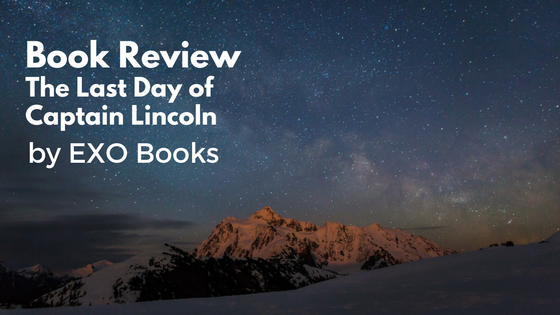
I received a free e-book copy in exchange for an open and honest review.
This novella is unique. One that has made me think more philosophically about life and death than any other book I have read this year. The Last Day of Captain Lincoln chronicles the final day that the main character, Captain Lincoln, is alive. The story is set way way in the future, on a space shuttle orbiting a far off star. The colony consists of 132 people. Exactly. Eight new babies are born every 5 years and live for exactly 80 years. On a ‘cohort’s’ 80th birthday, they all die, giving space and resources for the 8 newborns. This story follows Captain Lincoln as he celebrates his 80th birthday, his last day alive.
 Now the premise in itself is interesting and I will talk about it in a bit. But the reason this came to my attention was from the author themselves. They talked about a social justice component to their book (different from diverse representation), which I found super interesting while reading. To start off, I cannot really comment on the racial or ethnic identities on the characters because they were never stated, but I assumed they were White based on the pop cultural references in the book (music, quotes, etc.). There is a sparse commentary on love and sexual orientation, which shows the ship as an accepting environment. However, I did not find the representation all that compelling when it comes to diverse representation of main characters. The compelling commentary and underlying narrative was one of social justice.
Now the premise in itself is interesting and I will talk about it in a bit. But the reason this came to my attention was from the author themselves. They talked about a social justice component to their book (different from diverse representation), which I found super interesting while reading. To start off, I cannot really comment on the racial or ethnic identities on the characters because they were never stated, but I assumed they were White based on the pop cultural references in the book (music, quotes, etc.). There is a sparse commentary on love and sexual orientation, which shows the ship as an accepting environment. However, I did not find the representation all that compelling when it comes to diverse representation of main characters. The compelling commentary and underlying narrative was one of social justice.
The first piece that peeked my interest in the book was in the class that Captain Lincoln was asked to teach on his last day. Before Captain Lincoln takes over the class to talk about death (oh the joy oh talking about death right before you know it will happen), the instructors are talking a little bit about the history on earth and challenging students to think about why life on earth did not work. While not detailed, the scene is constructed in a way where students are allowed to respond and fall into the usual traps that rationalize privilege and oppression. I hoped this chapter would have gone on longer, because I thought the critique of our modern society was a much needed one to give. I also thought it went well with the story line as we were just recently introduced to the idea of a set 80 year lifespan. This chapter got the ball rolling on what I thought was the overarching theme of spaceship society.
The whole book imagines a society of near complete equality. Part of the reason there was not a lot of commentary on diverse representation may have been purposeful in showing this type of utopia – where identity truly does not matter. Every person born in the society has the same lifespan, the same access to health care, the same opportunities for employment, the same access to food, and no system of wealth. So it sparks the age old question… how do we achieve equity in our own society? This book is quite an extreme example and at the same time the ship society is highly regulated (birth rates, etc.) and unregulated (jobs, wealth, access to benefits, etc.). And it asks the question of which is better: knowing your lifespan and knowing you will live exactly 80 years… or the variability of lifespan and not knowing the exact date of death. The average lifespan on earth currently is less than 80 years (~70). Not everyone has the access to resources that would allow them to even hit the average lifespan. This is a huge equalizer and as someone who lives in a place where my average lifespan is higher than the average, I could easily argue against the 80 year lifespan. But for folks in places with limited health care, high child mortality rates, and other conditions that shorten average lifespans, the 80 year guarantee seems pretty good.
I did not know what to expect from this book, but I was surprised at the commentary about how our modern society works (or doesn’t). The Last Day of Captain Lincoln is a short read, but full of big questions that will make you think after you finish. Beyond social justice commentary, this book is about love, loss, and how does one live a fulfilling life. Death is sad and full of grief. And in western culture it is seen as one of the worst things imaginable. I think death will remain sad, but what is death after one lives a full life?
Final Rating 3.8/5

This is a wonderful review of what sounds like a very compelling and thought-provoking book. It’s interesting that everyone in this novella has the same access to opportunities and that there’s no system of wealth. Is there no competition for anything? It’s hard to achieve equity in our society for so many reasons, including our competitive framework. Everyone wants to “win” and that means some people have to “lose.”
LikeLike
Posted by A.M.B. | January 13, 2017, 11:57 AMYou pose an interesting question about competition. From reading the book, it is presented in a way where there is no competition. While growing up, children learn and are required to perform certain responsibilities… but everyone must participate. When it comes to jobs, individuals are encouraged to follow their passions (you will read about one of them during the chapter of the banquet). And there is no negative consequences for following one’s passion. It brings up the bigger question… is competition a learned thing, or is it in our nature? Would a society like this one stay as is throughout time (assuming they adhere to their structure) or would it natural devolve?
LikeLike
Posted by Brendon | January 13, 2017, 3:28 PMWe get into this in the very next novella, so please be patient! It’s about 12 your old kids and is all about competition.
Competition comes in many forms, right? Even if you eliminate economic competition, individual competition still takes place in several ways (me competing/fighting with my brothers jumps to my own mind). There is also competing against oneself, like practicing an instrument or building the body.
I certainly come down as competition as a natural thing though, a rule of nature when you consider Darwin and evolution. Yet that doesn’t mean that there aren’t many learned aspects of competition. Some societies are certainly more competitive than other societies, and some are far more focused on individual competition to the great detriment of the group. To put it in contrast, some of the Native American tribes here in New York State had to consider big decisions out to 7 generations before the tribe acted. Another example, many tribes all over the globe weren’t monogamous but had these sorts of group marriage things. That’s night and day compared to the sexual competition and then further contortions our societies force us into. They also go to show the massive imprint societal customs and mores can have.
LikeLiked by 1 person
Posted by EXO Books (@EXO_Books) | January 13, 2017, 8:06 PMOh that is great to hear the next novella will dive into that question. I like you contrasting examples of different cultural values placed on competition and it’s potential impact on a group of peoples. I have observed a similar cultural phenomenon of ‘Western’ culture valuing individualism and competition in that matter, whereas many other cultures (devalued in the West) focus more on community.
Marriage and sexuality and culture… that is a big topic to break into here in comments 🙂
LikeLike
Posted by Brendon | January 14, 2017, 2:51 PMIt sounds like the book has a fantastically unique premise, which just contributes to its though-provoking nature. I really enjoy books that can make you contemplate things on an intellectual and psychological level. The fact that this done in a novella is quite amazing. Your review was brilliant and introduced me to something I probably wouldn’t have discovered otherwise. Thank you. 😊
LikeLiked by 1 person
Posted by biblionyan | January 15, 2017, 8:01 AMThank you for stopping by and your wonderful comment. I enjoy books as well that make me contemplate although most of the time it makes me tired or it makes me stop reading to do some serious thinking. Apparently, EXO Books is writing a series of novellas which I will probably read at some point.
LikeLike
Posted by Brendon | January 17, 2017, 2:53 PMThat’s definitely an I intriguing premise! And I like the prospect of delving deeper into the aspect of conpetition.
I think here in capitalist societies we definitely immediately hear concerns about security vs creativity, a la the starving artist trope etc.
LikeLiked by 1 person
Posted by Bina | January 16, 2017, 1:26 PMOh yes capitalism. That novella should be very interesting to address competition. Particularly with capitalism as competition because money fuels everything (okay that sounds absolute but sometimes I legitimately feel that way) and wealth is used to uphold systems of privilege and oppression. If competition is naturally in humans (a la the author’s comment above), how can a society like the one in this novella maintain, even with the lack of monetary competition?
LikeLike
Posted by Brendon | January 17, 2017, 2:59 PMGreat review. I like how the book has sparked your mind to ask questions about equality, life and death, And the premise is very interesting as well – eight new borns every five years. Nice that you enjoyed the read
LikeLiked by 1 person
Posted by Resh Susan @ The Book Satchel | January 17, 2017, 11:36 AMThank you for reading and commenting! With eight children born every 5 years… I always wonder what if one of the eight does not build relationships with their cohort? Are their people alone on the ship?
LikeLiked by 1 person
Posted by Brendon | January 17, 2017, 3:01 PMMore questions…
LikeLike
Posted by Resh Susan @ The Book Satchel | January 17, 2017, 10:15 PM